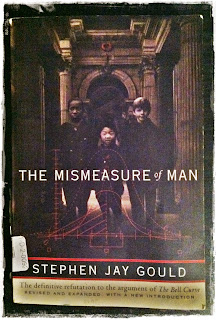 Last year, I read the book entitled The Leipzig Connection by Paolo Lionni. That little book, with only ninety pages, exposed me to the development and shaping of our now current broken educational model. The Mismeasure of Man, by Stephen Jay Gould, adds important ancillary knowledge that The Leipzig Connection lacked. Now, a more vivid historical perspective on the history of education is beginning to emerge. What role does IQ testing play in our current educational system, and how did it originate? How did it shape education? Society?
Last year, I read the book entitled The Leipzig Connection by Paolo Lionni. That little book, with only ninety pages, exposed me to the development and shaping of our now current broken educational model. The Mismeasure of Man, by Stephen Jay Gould, adds important ancillary knowledge that The Leipzig Connection lacked. Now, a more vivid historical perspective on the history of education is beginning to emerge. What role does IQ testing play in our current educational system, and how did it originate? How did it shape education? Society?This book is about the general argument of biological determinism. It argues that behavioral norms, and the social and economical differences between human groups - primarily races - arise from inherited, inborn distinctions, and that society, in historical perspective, are a natural and accurate reflection of biology. The chief tenant of this book is the refutation of the claim that 'worth' can be assigned to individuals and groups of people by measuring intelligence as a single quantity, as noted in the book entitled The Bell Curve. There have been two distinct sources of data throughout history that have supported this claim: craniometry, and certain styles of psychological testing.
Historically, IQ testing was originally meant to be used as an assessment tool that could help place children with significant cognitive disabilities into intervention programs - almost a precursor to special education. It was not however, meant to be used for the determination of 'worth' of different types of human groups, as it eventually became. As a result, the 'dominant race' now had scientific proof that all other races were intellectually inferior. This significant logic of thinking - although erroneous - exacerbated intellectual racism.
Worst yet, IQ testing infiltrated educational systems. The Stanford-Binet IQ test became the paradigm for all other tests that followed. "Thirty minutes, and five tests might mark a child for life, if schools adopted the following examination, advertised Terman 1923." Clearly, it has had significant ramifications.
This book is clearly worth a read for the amount of significant information it contains in regards to racism, education, and the general argument of biological determinism. It's interesting to learn how far individuals were willing to go in order to prove that one group of people were intellectually inferior to other groups. The Bell Curve attempted to prove this claim; The Mismeasure of Man proves otherwise. As human beings, we are prone to genetic deformities - this is proven fact. How far reaching is that within individual races? What role does the belief of Social Darwinism fit within this historical context?
"Finally, think about one more Darwinian line - perhaps the greatest - from the slavery chapter in the Voyage of the Beagle. We learn about diversity in order to understand, not simply accept: If the misery of our poor be caused not by the laws of nature, but by our institutions, great is our sin."Stephen Jay Gould is the author of thirteen other books and teaches geology, biology, and the history of science at Harvard University.